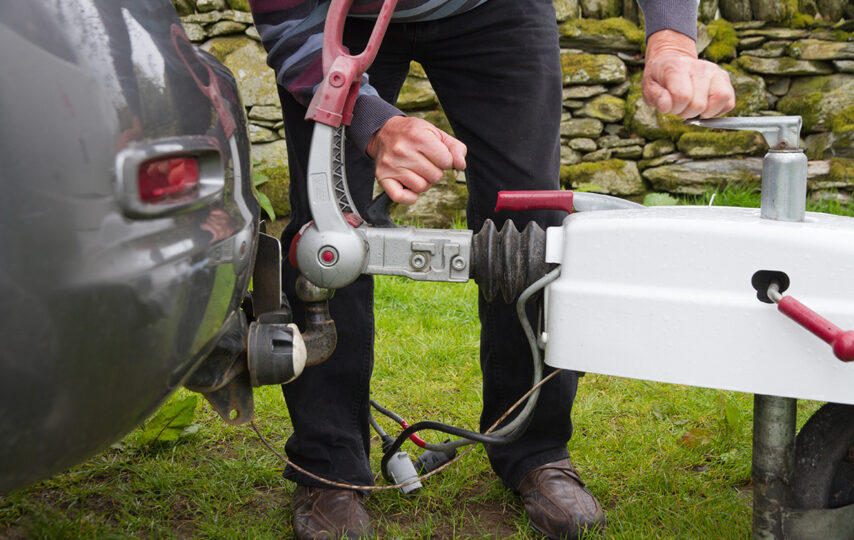Towing can seem like an easy task. But, it comes with its own set of risks. Towing accidents are not uncommon and can lead to severe consequences. For this reason, it’s vital to know what an important safety device is when towing.
An invaluable safety device when towing is a trailer brake controller. A trailer brake controller is an electronic device that allows the driver to apply the brakes on the trailer independently of the towing vehicle.
It helps maintain control and stability by ensuring that the trailer’s brakes engage simultaneously with the towing vehicle’s brakes. This prevents the trailer from pushing or swaying the towing vehicle. The brake control device is especially crucial when towing heavy loads or traveling downhill.
When you tow a vehicle or trailer, several essential safety devices need to consider. Let’s discuss top safety devices when towing.
What Are Important Safety Devices When Towing?
When towing a trailer, the braking system is undoubtedly crucial in ensuring safety. But there are several other critical safety devices that we need to pay attention to as well. These devices make the towing experience safer, more comfortable, and less prone to accidents. Such as:
- Trailer Hitch
- Safety Chains
- Trailer Lights and Wiring
- Towing Mirrors
- Tire Pressure Monitoring System (TPMS)
- Weight Distribution Hitch
01. Trailer Hitch
A properly installed and appropriately selected trailer hitch cannot overstate its importance when towing a trailer. This ensures a secure attachment between the towing vehicle and the trailer and minimizes the risk of accidents. It can result in severe damage, injury, or even fatalities.
Different hitches suit specific needs, such as GWR, TW, receiver size, and coupling mechanism. In the selection process, each type plays a crucial role. Choosing an appropriate hitch for your needs ensures better towing safety and performance.
02. Safety Chains
By preventing accidents caused by failed hitches, the safety chains provide an additional layer of security. These chains are made from robust materials like steel or heavy-duty nylon and connect the trailer to the tow vehicle.
Regardless of the trailer’s size or weight, safety chains should use every time it’s towed. When attaching the chains, they should cross beneath the trailer tongue to create a cradle that can offer additional support in case of an emergency.
03. Trailer Lights and Wiring
While towing, trailer lights and wiring play a key role in maintaining safety on the road. These critical features allow drivers to signal their intentions and communicate with other drivers on the road.
A non-working trailer light and poor wiring can lead to dangerous road conditions as other drivers struggle to understand the movements of the towing vehicle.
Brake lights, turn signals, and tail lights are three fundamental features that aid in communication and safe towing. They clearly indicate when a driver slows down, allowing others to adjust their speed accordingly.
Proper trailer lighting can serve as an additional safety measure, enhancing visibility while towing. It is imperative to have high-quality trailer lighting and wiring installed, especially when navigating high-risk weather or low-light conditions.
04. Towing Mirrors
Towing a trailer requires extra caution and attention on the road. Rearview mirrors can become obstructed, hindering drivers’ ability to maneuver and switch lanes without incident. That’s where towing mirrors come in, providing an extended range of view to ensure safe driving practices.
These mirrors are necessary for any towing vehicle to enhance the driver’s visibility of the trailer’s sides and rear. They come in a range of sizes, types, and shapes and can be either clip-on models that attach to existing mirrors or replacement mirror assemblies.
Towing mirrors are highly versatile, with adjustable angles, electric adjustment options, heating capabilities for cold weather, and built-in turn-signal indicators. They offer many features to make driving with a trailer more manageable and safer.
05. Tire Pressure Monitoring System (TPMS)
TPMS is a crucial tool for monitoring tire pressure, especially while towing. This aftermarket device comprises sensors placed in each tire to provide real-time data on tire pressure levels.
The data is transmitted to a monitoring device on the dashboard, enabling drivers to keep track of any changes that might require attention. By detecting low tire pressure and potential blowouts, TPMS enhances road safety and ensures optimal driving performance.
06. Weight Distribution Hitch
Due to spring bars, a weight distribution hitch distributes weight evenly between the towing vehicle and the trailer. It transfers tongue weight from the hitch to the front axle of the towing vehicle and then distributes it evenly to all four wheels. This reduces sway and fishtailing and improves control and stability.
Accidents caused by an unbalanced load during sudden stops or turns can be prevented due to even weight distribution. That’s why it’s an essential safety measure for you and others on the road.
But in an accident, you can always count on tow truck services to provide professional assistance. These services come equipped with specialized tools and experienced professionals who safely secure your vehicle and trailer.
What does a brake controller do for towing?
A brake controller is a paramount safety feature when it comes to towing. While towing, this device regulates the power to the trailer brakes, ensuring that the trailer slows down in unison with the tow vehicle. It prevents potential collisions and reduces the wear and tear of the tow vehicle and trailer brakes.
Brake controllers come in various types, each with distinctive features that cater to specific towing needs. Proportional brake controllers’ use advanced technology that senses how hard or soft the tow vehicle is braking. The it applies the right pressure to the trailer brakes.
On the other hand, the time-delayed brake controller comes equipped with a preset delay before it applies pressure to allow for smooth stops. By functioning well, brake controllers significantly reduce stopping distances. It elevates the overall safety levels of the towing setup.
Don’t Compromise on Towing Safety
Ensuring safety when towing loads demands a holistic approach. Merely using a brake controller that aligns with your towing specifications is insufficient. It would be wise to familiarize yourself with the plethora of safety devices that minimize risks and make towing safer for everyone on the road.
Besides employing brake controllers, an appropriate trailer hitch for your vehicle is essential. You also need safety chains, functioning trailer lights and wiring, towing mirrors, and a weight distribution hitch.
A weight distribution hitch alone ensures that your trailer’s weight distributes evenly across the towing and trailer axles, increasing stability while towing. Before every trip, check brake controllers, hitch pins, ball mounts, and other towing infrastructure for functionality.
Research indicates that lack of maintenance and faulty infrastructures contribute to many road accidents during towing. Mastering every aspect of towing safety and heeding the manufacturer’s towing instructions will enable you to undertake safer travels.







